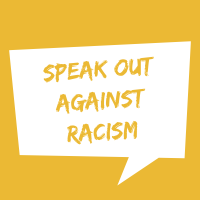Speak Out Against Racism
A guide to understanding racism in Ireland, your rights, and what to do if you see or experience racism
Um guia para compreender o racismo na Irlanda, os seus direitos, e o que fazer se presenciar ou for vítima de racismo está disponível aqui
Un guia para entender el racismo en Irlanda, tus derechos, y cómo actuar si eres testigo o víctima del racismo está disponible acá

Understanding Racism
Racism is when you are discriminated against, treated differently, or less favourably than someone else because of your race, colour, nationality, ethnic, or national origins. Racism can be deeply traumatic and have a devastating impact on people’s lives.
There are different types of racism: physical, verbal abuse, institutional racism (for example, a school or college that discriminates against someone because of the colour of their skin), online racism, and indirect racism (for example, being treated differently in the workplace because of your race).
Racism can be either criminal (hate crime) or non-criminal (not a hate crime).
- Examples of criminal racial discrimination: A hate motivated assault, harassment, threats, or trying to incite hatred against a person because of their race, colour, nationality, ethnic or national origins.
- Examples of non-criminal racial discrimination: Racist jokes, insensitive or racist comments, stereotypes, institutional racism, or indirect racism.
Your Rights
You have the right not to be discriminated against. If you experience a hate crime, you can report the incident to the Gardai. The laws that protect you from racial discrimination in Ireland are the Criminal Justice (Hate Offences) Act 2024, the Employment Equality Act and the Equal Status Act.
- The Employment Equality Acts 1998-2015 - You have the right not to be discriminated against because of your race in the workplace or when you are looking for work. More information can be found here.
- The Equal Status Acts 2000-2018 - You have the right not to be discriminated against because of your race when you buy or sell something or access services (something that is done for you) including housing and education. More information can be found here.
What to do if you see or experience Racism
It is important to speak out against racism, to take action, and report it. If you see or experience racism, follow these steps:
Step 1: Stay Calm and Speak Up
If you feel that the situation is safe, speak up. Calmly tell the person who is behaving in a racist way that racism is unacceptable.
Step 2: Document the Incident
Keep a detailed record of what happened, including dates, times, locations, and any witnesses. If you feel safe, take photographs or videos as evidence.
Step 3: Show Solidarity
If someone has been racial abused, show solidarity by listening and helping them to call a friend or a family member.
Step 4: Report it
Report the racist incident as reporting allows people who experience or witness racism to do something about it and break the silence. Remember, if you ever feel threatened or are in danger, call 999 or 112.
- If you think the racist incident was a crime, such as, an assault, hate speech, damage to property or sharing racist material, report it to An Garda Siochana at your local Garda station or online.
- The Workplace Relations Commission (WRC) deals with discrimination relating to employment, buying or selling goods (a good is any type of product, for example, books, clothes, cosmetics, or the food you buy in the supermarket), or accessing a service. Find out more here.
- You can report any racist incident on the Irish Network Against Racism’s iReport.ie system. By reporting you are helping to document and understand the problem of racism in Ireland.
- If you have witnessed or experienced racism in your school, college or university, you should report the incident to the international office, the Students’ Union, or the school management. If the racist incident is in relation to a member of staff, you should look to follow the complaints procedure of your school, college or university.
Getting Support
- The Crime Victims Helpline provides support and information to victims of crimes. They can be texted on 0851337711. More information can be found here.
- Free Legal Advice Centre (FLAC) offers basic legal information through its telephone information service (1890 350 250). Find out more here.
- Mental Health Ireland provide resources and support to people who experience mental health difficulties and trauma: More information can be found here.
Additional Information and Resources
The Irish Network Against Racism (INAR) is a national network of civil society organisations that work together to highlight and tackle racism in Ireland. Read about the work of INAR here.
The Irish Human Rights and Equality Commission (IHREC) promotes equality and combats discrimination, including racism, through legal assistance and public awareness campaigns. You can read more about your rights here.
The National Action Plan Against Racism (NAPAR) is a Ireland’s national plan to address racism. You can read more about the NAPAR here.
The Public Sector Duty is a legal obligation on public services to promote equality and eliminate discrimination. Read about the Public Sector Duty here.

